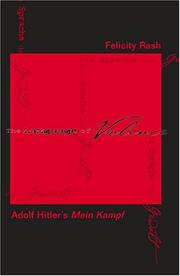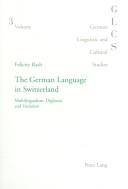| Listing 1 - 10 of 17 | << page >> |
Sort by
|

ISBN: 0820488070 0820481874 9780820481876 9780820488073 Year: 2006 Publisher: New York, N.Y. Lang
Abstract | Keywords | Export | Availability | Bookmark
 Loading...
Loading...Choose an application
- Reference Manager
- EndNote
- RefWorks (Direct export to RefWorks)
This unique linguistic analysis of Adolf Hitler's Mein Kampf examines how Hitler constructed Feindbilder (images of the enemy) and, in contrast, glorified the so-called Aryan race using a variety of lexical and rhetorical resources. Hitler's anti-Semitic imagery is analyzed in detail using the modern cognitive theory of metaphor associated with George Lakoff and Mark Turner. This book, which includes English translations for all quotations from Hitler's German text, reveals how anti-Semitic discourse may act as a paradigm for all racist and totalitarian propaganda. It will appeal to linguistics scholars and those in other fields - particulary historians and political theorists.
German language --- Pragmatics --- Hitler, Adolf --- Violence in literature --- Nazis --- Ideology --- Language and languages --- Language --- History --- Political aspects --- Rhetoric --- Hitler, Adolf, --- Criticism, Textual --- Violence in literature. --- Foreign languages --- Languages --- Anthropology --- Communication --- Ethnology --- Information theory --- Meaning (Psychology) --- Philology --- Linguistics --- Knowledge, Theory of --- Philosophy --- Political science --- Psychology --- Thought and thinking --- National socialists --- Fascists --- Socialists --- National socialism --- Neo-Nazis --- Language. --- Rhetoric. --- Gitler, Adolʹf, --- Hsi-tʻe-le, --- Hitlar, ʼAdolf, --- Chitler, Adolphos, --- Hitler, Adolph, --- Khitler, Adolf, --- Hitlerus, Adolfus, --- Hiṭlar, Aṭālpu, --- היטלר --- היטלר, אדולף, --- Criticism, Textual. --- Nazis - Language --- Ideology - Germany - History - 20th century --- Language and languages - Political aspects - Germany --- German language - Rhetoric --- Hitler, Adolf, - 1889-1945. - Mein Kampf - Criticism, Textual --- Hitler, Adolf, - 1889-1945 - Language --- Hitler, Adolf, - 1889-1945. - Mein Kampf --- Hitler, Adolf, - 1889-1945

ISBN: 3906757684 9783906757681 0820434132 Year: 1998 Volume: 3 Publisher: Bern Peter Lang
Abstract | Keywords | Export | Availability | Bookmark
 Loading...
Loading...Choose an application
- Reference Manager
- EndNote
- RefWorks (Direct export to RefWorks)
Book
ISBN: 0230282652 1137030216 1283738147 1349328545 Year: 2012 Publisher: Palgrave Macmillan UK
Abstract | Keywords | Export | Availability | Bookmark
 Loading...
Loading...Choose an application
- Reference Manager
- EndNote
- RefWorks (Direct export to RefWorks)
Book
ISBN: 3906768945 9783906768946 Year: 2002 Publisher: Bern Lang
Abstract | Keywords | Export | Availability | Bookmark
 Loading...
Loading...Choose an application
- Reference Manager
- EndNote
- RefWorks (Direct export to RefWorks)
Book
ISBN: 3110118629 3110868504 Year: 1989 Volume: 25 Publisher: Berlin ; New York : W. de Gruyter,
Abstract | Keywords | Export | Availability | Bookmark
 Loading...
Loading...Choose an application
- Reference Manager
- EndNote
- RefWorks (Direct export to RefWorks)
German language --- Dialects --- Switzerland --- Foreign words and phrases --- Ashkenazic German language --- Hochdeutsch --- Judaeo-German language (German) --- Judendeutsch language --- Judeo-German language (German) --- Jüdisch-Deutsch language --- Jüdischdeutsch language --- Germanic languages --- Foreign elements --- French. --- Italian.
Book
ISBN: 9783319731070 9783319731087 3319731076 3319731084 Year: 2018 Publisher: Cham Palgrave Macmillan
Abstract | Keywords | Export | Availability | Bookmark
 Loading...
Loading...Choose an application
- Reference Manager
- EndNote
- RefWorks (Direct export to RefWorks)
This book addresses the many avenues that are still left unexplored when it comes to our understanding of the First World War in the Low Countries. With the ongoing the centenary of the Great War, many events have been organized in the United Kingdom to commemorate its military events, its socio-political consequences, and its cultural legacy. Of these events, very few have paid attention to the fates of Belgium or the Netherlands, even though it was the invasion of Belgium in August 1914 that was the catalyst for Great Britain declaring war. The occupation of Belgium had long-term consequences for its people, but much of the military and social history of the Western Front concentrates on northern France, and the Netherlands is largely forgotten as a nation affected by the First World War. By opening the field beyond the military and beyond the front, this collection explores the interdisciplinary and international nature of the Great War.
History of the Netherlands --- History of Belgium and Luxembourg --- anno 1910-1919 --- Europe—History—1492-. --- Military history. --- History, Modern. --- Civilization—History. --- Social history. --- History of Modern Europe. --- History of Military. --- Modern History. --- Cultural History. --- Social History. --- Civilization --- History, Modern --- Military history --- Social history --- History
Book
ISBN: 9783110868500 3110868504 0899255264 9780899255262 Year: 2013 Publisher: Berlin Boston
Abstract | Keywords | Export | Availability | Bookmark
 Loading...
Loading...Choose an application
- Reference Manager
- EndNote
- RefWorks (Direct export to RefWorks)
Digital
ISBN: 9783319731087 Year: 2018 Publisher: Cham Springer International Publishing :Imprint: Palgrave Macmillan
Abstract | Keywords | Export | Availability | Bookmark
 Loading...
Loading...Choose an application
- Reference Manager
- EndNote
- RefWorks (Direct export to RefWorks)
This book addresses the many avenues that are still left unexplored when it comes to our understanding of the First World War in the Low Countries. With the ongoing the centenary of the Great War, many events have been organized in the United Kingdom to commemorate its military events, its socio-political consequences, and its cultural legacy. Of these events, very few have paid attention to the fates of Belgium or the Netherlands, even though it was the invasion of Belgium in August 1914 that was the catalyst for Great Britain declaring war. The occupation of Belgium had long-term consequences for its people, but much of the military and social history of the Western Front concentrates on northern France, and the Netherlands is largely forgotten as a nation affected by the First World War. By opening the field beyond the military and beyond the front, this collection explores the interdisciplinary and international nature of the Great War.
World history --- History of civilization --- History --- History of Europe --- Eerste Wereldoorlog --- nieuwste tijd --- cultuurgeschiedenis --- geschiedenis --- literatuur --- sociale geschiedenis --- Europese geschiedenis --- nieuwe tijd --- anno 1910-1919 --- Belgium --- Europe
Book
Abstract | Keywords | Export | Availability | Bookmark
 Loading...
Loading...Choose an application
- Reference Manager
- EndNote
- RefWorks (Direct export to RefWorks)
Book
Year: 1998 Publisher: Bern Peter Lang
Abstract | Keywords | Export | Availability | Bookmark
 Loading...
Loading...Choose an application
- Reference Manager
- EndNote
- RefWorks (Direct export to RefWorks)
| Listing 1 - 10 of 17 | << page >> |
Sort by
|

 Search
Search Feedback
Feedback About UniCat
About UniCat  Help
Help News
News